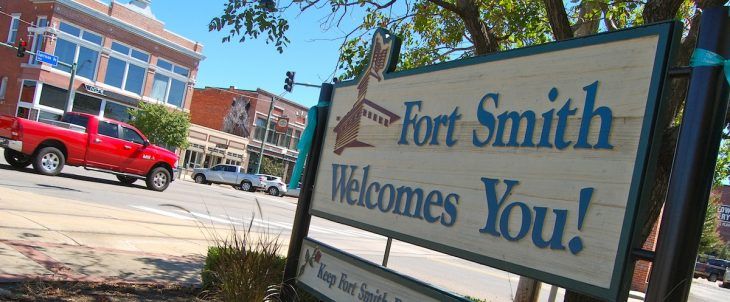Fort Smith Board talks tax increases, alternative funding sources at budget review
by June 9, 2017 6:05 pm 1,783 views

The Fort Smith Board of Directors broached the contentious topic of alternative funding sources to help the city’s cash-strapped budget at a special study session on Friday (June 9) from the River Valley Nature Center at Chaffee Crossing.
City officials were able to turn in a balanced budget for 2017, but those numbers included a surplus of just $27,000 and did not allow the Board to appropriate additional contributions to the diminishing local police and fire pension plan (LOPFI), which is projected to exhaust in 2029.
The city’s police department is also understaffed with outdated equipment, and merit increases have been frozen for all city employees – police and every other department – for the last two years. The police department specifically has been operating with obsolete technology that includes dispatch network hardware, computers, portable radios, mobile car radios, and backup dispatch radios. Furthermore, 30 of 51 vehicles are over 100,000 miles and eight are over 200,000 miles. Personnel-wise, the department is short 11 sworn officers (140 out of 151 authorized).
Finding a dedicated funding source was a desire of the Board, but Director Keith Lau, referring to the recent recycling issue and the city’s misinformation surrounding it, said the city had “bankrupted our political capital with citizens.”
“There’s no way we can ask for a tax increase of any kind this year and maybe next year. So we need to look at it maybe three years down the road. Whenever we can build this account back, we can go ask the citizens,” Lau said. “In the meantime what are we going to do in years one and two to hit these major other structural problems – police compensation, police equipment – and then maybe go in 2019 to try and attack a funding request with a tax increase.”
Fort Smith City Administrator Carl Geffken responded that it wasn’t just the Board’s political capital in play.
“Not to minimize the role of the Board, but it’s not necessarily just your political capital. It’s really the political capital of the police department and police chief and the outreach he’s been doing. He’s the one, with his staff, who has gone out into the community to show the need and the issues.”
Director Tracy Pennartz suggested as another alternative funding source to look at the $770,000 subsidy the city provides each year to the Fort Smith Convention Center as a way to address police issues and address Convention Center needs through a possible prepared food tax instead. Such a move could be a hard sell for Fort Smith voters, who rejected an attempt in a November 2011 special election, with approximately 62.7% voting against it.
“The nice thing about the prepared food tax is that 60-70% of that is paid by people who don’t live in Fort Smith. So if you’re talking about the impact of tax burden, that’s the least impact on the tax burden on Fort Smithians compared to a penny or a half-penny on something else,” Pennartz said.
Director Mike Lorenz also agreed the city had a revenue problem that would need to be addressed through increased taxes or otherwise.
“I’m not a fan of sales tax, but how do we pay for the things that our citizens want?”
Lorenz continued: “I think that’s the key thing we’ve got to remember. We either provide the services and have the revenue to pay for it, or we don’t provide the services. Those are our only two options.”
